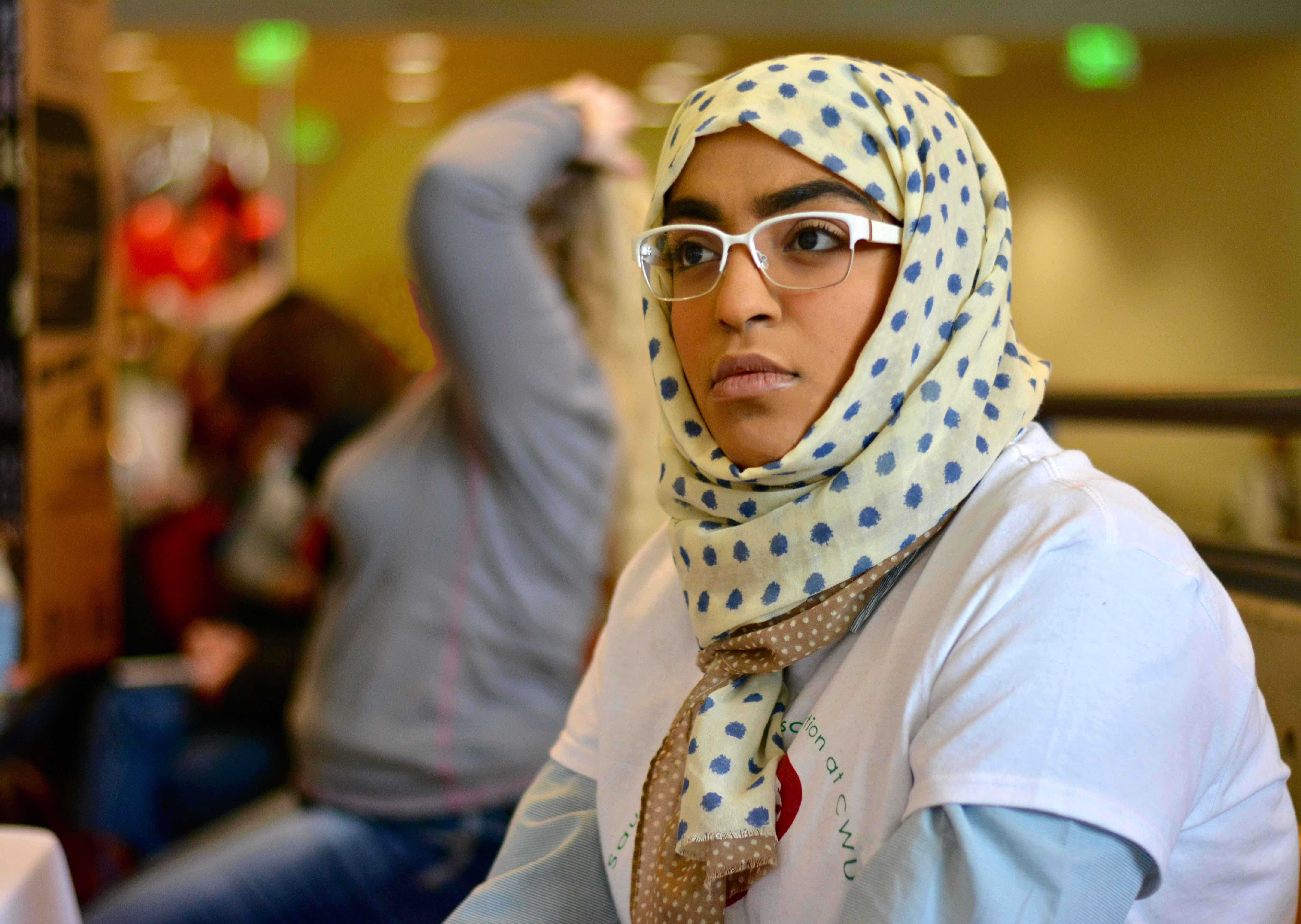Muslim students face bigotry on Central’s campus
April 7, 2016
It was a warm spring day last year when Zahiah Alkharnda walked down the Walnut Mall in front of the SURC. A student standing to the side stopped his conversation with another student to spit at her feet.
Zahiah, a Central student—and a Muslim—said it wasn’t the first time she had experienced someone spitting at the ground near her feet. It was the third time.
Zahiah, who wears a hijab, said she often receives sideways glances while walking on campus, but it happens so often she is no longer bothered by it. At first she said she thought the spitting might be just a coincidence.
“I heard one of my brothers was mentioning it [with] my other sister and she said, ‘No, it’s actually done immediately when they see us,’” she said. “When my brother and sister said something about it, that’s when I knew that’s what they meant.”
Zahiah and her five siblings all currently attend Central and all have experienced some sort of negative experience on campus due to their religious beliefs and appearances.
She recounted another episode that happened one day after she got off of work at the International Center.
“I was standing in the parking lot and two guys said something; I heard the word ‘Muslim,’” she said. “I was scared. It was dark and my phone died. Their car was in front of me. They were walking around their car at me. Thankfully, nothing happened [because] my boss came out and waited with me.”
It’s difficult to determine how widespread such incidents are because of a genuine reluctance to discuss the matters on the part of many Muslim students. Several members of the Saudi Student Association say they have heard allegations of negative behavior towards Muslims, but they don’t feel comfortable telling those stories of those individuals without the victim’s permission.
Despite their silence, some on campus are sensitive to the issue. For example, Geraldine O’Mahony, an Islamic Studies professor, recently introduced and gained passage for a resolution asking the Faculty Senate to stand in solidarity with Muslim students.
“We, the Central Washington University faculty, condemn in the strongest possible terms the growing bigotry and xenophobia in our country’s political discourse and practice, and in particular recent calls to ban the entrance of Muslims into the United States,” the resolution said.
Abdulaziz Bin Zuair, who is called Aziz by his friends, is a Central student and past president of the Saudi Student Association. He said one of the reasons it is difficult for Muslim students to talk publicly about their experiences is because many, particularly females, are accustomed to keeping such matters private and only discussing them within their family or with close friends. He recounted a story about three young women who he said were once accosted on a local bus.
“No one really knows what happened,” he said, and he did not elaborate. He noted some women wearing the hijab say that people often stare at them, which can make them feel uncomfortable and not socially accepted.
* * *
A large part of what makes female Muslim students stand out is the fact that many wear the hijab. Zahiah, however, said she doesn’t wear it for attention—that’s the last thing she wants.
Sitting in a coffee shop, Zahiah speaks so softly it’s difficult to hear her voice over the scraping of metal chairs and the dim roar. Her hijab is light grey and frames her face. She peers through her white-frame glasses, her eyes flicking up to the ceiling when asked about negative stereotypes surrounding wearing the hijab.
“For me, I see it as my protection. I see it as me. You know, this is part of me,” she explains. “You don’t [have] to tell someone why are you wearing a hat, why are you wearing a jacket, why are you wearing a long dress, you just do it. It’s part of you.”
She repeated that a huge part of wearing the hijab is protection. It shows that women are not for “everyone to have.”
“I’m very valuable and not everyone can see me,” Zahiah said. “It is a choice and that’s what I try to tell people. It is actually a choice.”
The hijab is a major point of contention among some in the Western media because some view it as a way of oppressing women, according to O’Mahony.
“The only way to be a ‘free woman’ is to wear heels and bare your skin . . . that’s a description of what freedom is that is a different type or form of oppression,” she says. “Freedom is to wear or not to wear whatever you want.”
* * *
Many who study Islam, including O’Mahony, believe a big reason why some Muslim students have had negative experiences on campus is the lack of knowledge about Islam.
“I noticed over the last few terms . . . the way in which things have been said have been reflecting the national dialogue,” she said. “As GOP candidates or media talking heads have been saying certain things about banning Muslims . . . that language consciously or unconsciously, often unconsciously, has been filtering into the classroom.”
For several weeks, Aziz and Zahiah have set up a table in the Student Union and Recreation Center (SURC) to talk to students about Islam. They have posted a sign on the table saying, “Talk to a Muslim,” which includes a silhouette of a praying person.
On a recent day, they sat adjacent to several other tables promoting student organizations and watched a steady stream of students walking past. Several looked at the table with curiosity but no one stopped.
Aziz said they have not been met with any hostility but the number of students stopping by has gone down in recent weeks.
“We had ideas we wanted to implement but we didn’t, that is why we didn’t have more people coming and it started to feel useless,” Aziz later said in a text message. “We saw it [Talk to a Muslim] on Facebook, I think, and we thought of doing something similar.”
The Saudi Student Association is the only Muslim-affiliated group on campus. There is not a Muslim Student Association, much to the disappointment of O’Mahony, who said she has urged Muslim students to form such an organization for several years.
However, the Saudi Student Association has been the main group lobbying for accommodations for Muslim students on campus, such as a prayer room and specified workout times for female Muslim students at the recreation center. The latter is important because Muslim women are not comfortable wearing revealing clothing, such as athletic attire, in the presence of men.
The Associated Students of Central Washington University (ASCWU) and the Saudi Student Association have been working together over the past year to try to create a space that would fit the needs of Muslim students during the five necessary prayer times during the day. Carpeted floors, foot washing stations, and separate restrooms are some of the main necessities for a prayer room.
“It’s a really deep-rooted issue and I think maybe very specific, and very few people have been trying to address the issue over the years,” said Olivia Durham, ASCWU vice president for equity and community affairs. “I definitely think that, as far as I’m concerned, it’s been even more elevated of an issue.”
Rene Mahnke, ASCWU vice president for student life and facilities, said the Muslim students have been using the Green Room in the SURC as a temporary prayer room until they find something more permanent.
“The space has to be created, not found,” Mahnke said. “They’re a huge part of the campus, so many exchange students but also so many domestic Muslim students from Washington [are here.] They deserve the same treatment as everybody else.”
Although the topic of a specific workout time for female Muslim students was new to Mahnke, he said it makes sense that they would be interested in such an arrangement.
At a recent Saudi Student Association leader meeting, Zahiah said that last fall she sent a message to an Instagram account affiliated with recreation center workout classes about setting up a workout time for Muslim women only.
However, when a person from the recreation center came to the International Center on campus to ask them about specifics and what would work for the women, she thought the process the person outlined was long and cumbersome.
“Right now, when we asked them again, it seemed more complicated, which I don’t understand why,” Zahiah said.
For his part, Mahnke promised he would bring up the issue in a future meeting with SURC officials to see if something could be resolved so that female Muslim students might have a designated workout time and place.
* * *
Most of the Saudi Student Association leaders said they have enjoyed living in America and expressed they did not want to go back to Saudi Arabia once they graduate from Central.
Most Saudi Arabian students are required to go back to their home country after receiving their education from an American university, according to Aziz.
For his part, Aziz said he loves America and has spent nearly half of his life in the United States., including six years as an accounting student at Central. He said the best part about going to school in America is the ability to travel around the United States. As of right now, his favorite place to visit is Atlanta, Georgia.
“Eventually I want to leave, but not soon,” Aziz said with a smile.


Paul • Apr 10, 2016 at 10:20 pm
If the muslim females are indeed granted their own segregated workout times or space, will all students have to pay for it, or will fees be refunded proportionately? Additionally, if student funds, or state funds are used to create, maintain, or set aside space solely for Muslim prayer, will a chapel or Synagogue be supplied as well? Will the faculty stand or students stand with a group that maintains women as second class citizens? These are just some of my questions that as an Alum and tax pater that I would want to see answered.
Jash • Apr 7, 2016 at 6:11 pm
This is a non-story. It is not threatening or a hate crime to say the word “Muslim”. Nor is it bias not to give Muslims gender-segregated workout times or expensive and exclusive prayer facilities. This article is mostly about unsubstantiated reports by Muslims who do not want to go public about their complaints. No one can judge whether these non-reports are of any substance.
If you are the victim of a bias crime, then contact the campus authorities or the police.
“She repeated that a huge part of wearing the hijab is protection. It shows that women are not for “everyone to have.”
I do not wear the hijab. Does she think men are sexually entitled to me? This is the thinking of a rape apologist.